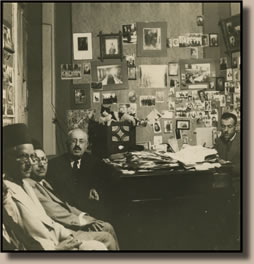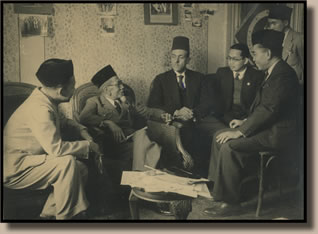"DAR ASHOURA"19
From the day Eltaher published his first newspaper “Ashoura” in 1924, its offices, or “Dar Ashoura”, became the meeting point for those who had fled their countries which were either under colonial occupation or were ruled by authoritarian regimes. Most of those who were unjustly treated, chased or whose homelands had been appropriated by others and were looking for security and a safe haven generally went to Egypt, whose welcoming people have always had a long tradition of tolerance and accommodation. These political refugees and asylum-seekers used to meet at “Dar Ashoura” without having to make a prior appointment. They all knew that the doors were open daily from 7pm to 9pm, and that they could even set their watches accordingly! As early as 1925, i.e. years before he created “Ashoura”, one could see Syrian nationalists of all political stripes meet with Palestinian nationalists and others who had been forced to leave their homelands by the colonial powers, all getting together wherever Eltaher convened.
|
With the Lebanese Druze and pan Islamic nationalist Emir Shakib Arslan; the Egyptian children books author Kamel Kilani and Mohamed El-Hehyaoui, Editor-in-Chief of the Egyptian newspaper "Al-Omma". Note Eltaher’s cat sitting on top of the radio at the old Ashoura office in Cairo in 1939.
|
At “Dar Ashoura” you would meet Iraqi poets such as Jamil Sidqui Al-Zahawi, historians such as Ahmad Ezzat Al-Aazami, or the political chronicler Rafael Butti, or the Yemeni leader Ahmad Mohamed Noman, who became Prime minister of his country many years later. You could also meet Muslim nationalist leaders from India such as Maulana Shawkat Ali and learned men such as Ajmal Khan.
|
Haji Agus Salim, first Indonesian Minister of Foreign Affairs
following the
independence of his country, along with other Indonesian nationalists at “Dar Ashoura” in Cairo 1946 |
You could also meet visitors from the Far East such as Dr. Sutomo from Indonesia, as well as his compatriots such as General Abdul Haris Nasution, Dr. Mohamed Hatta, Vice President of Indonesia, Ahmad Subarjo, Mohamed Rashidi, and Zein Hassan, who both became Indonesian ambassadors to Egypt following the independence of their country. You could also meet Abduljalil Hassan who became Mufti (religious leader) of the Malay (today known as Malaysia) and Dean of its university, the Afghan leader and future Minister Plenipotentiary in Egypt Sadeq Al-Mujaddedi, or Ibrahim Al-Saqqaf, leader of the Muslim community in Singapore, and tens of others who found at “Dar Ashoura” immediate rapport among friends, comrades, companions, acquaintances and supporters.
Many well-known Egyptian writers, journalists and poets attended Eltaher's lively "salon" regularly such as Wadie Philistin., the famous writer, scholar, and former professor at the American University in Cairo. The latter continues until now to publish articles about Arab and Egyptian literature. Another famous Egyptian literary figure at Eltaher's salon was Ali Ahmad Bakathir, several of whose plays were staged at the Royal Opera House in Cairo.


